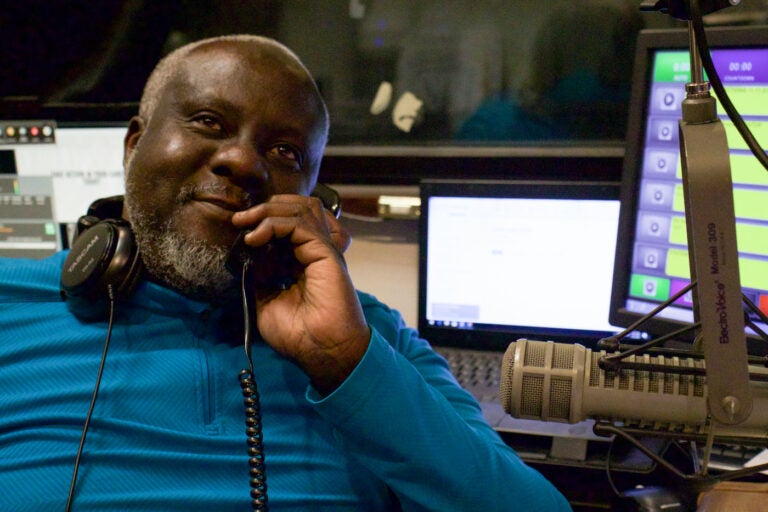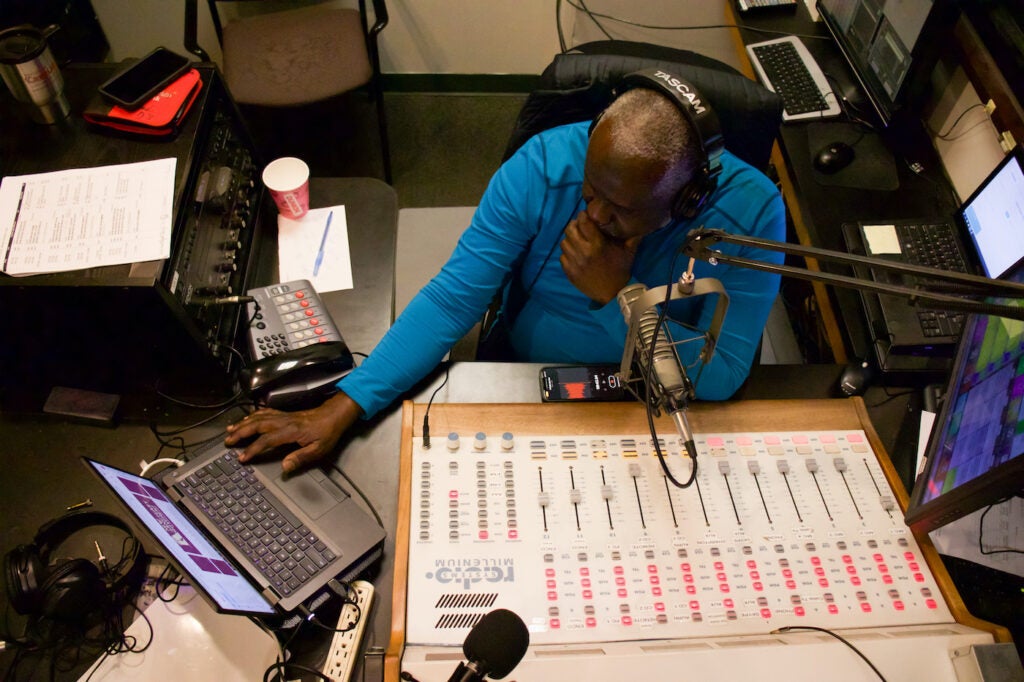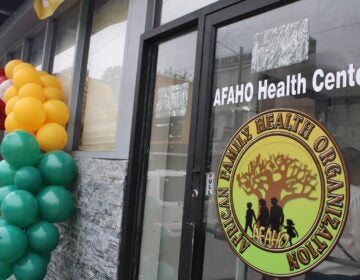WURD’s ‘Radio XALAAT’ gives Philly’s African diaspora ‘a home on the radio dial’
A weekly radio program has served Philadelphia’s African diaspora for decades. As ‘Africatown’ comes into force, Radio XALAAT’s host looks back.
Listen 1:27
Elhadji Ndiaye was on the air Dec. 2, 2023 for Radio XALAAT, the weekly Saturday program he’s run on WURD radio for 20 years. (Zane Irwin/WHYY)
From Philly and the Pa. suburbs to South Jersey and Delaware, what would you like WHYY News to cover? Let us know!
As immigration officials drew criticism last week for lurking outside Philadelphia courtroom hearings for holding and deportation, voices from across the community came out in protest.
Rights groups gathered outside the Criminal Justice Center on Dec. 4 to protest the practice. They warned predatory behavior by ICE would disrupt immigrants’ due process rights and deter victims of crimes from coming forward for fear of imperiling their legal status.
The protest marked a moment of unity among the city’s many immigrant groups. Elhadji Ndiaye, a Senegalese-born city analyst and radio host, urged listeners of his weekly program on WURD to join in expressing their outrage.
“As a certified ‘Welcoming City’ … there is no excuse for Philadelphia’s cruel collaboration with ICE,” Ndiaye said on a Dec. 2 edition of Radio XALAAT.
Radio XALAAT (pronounced “ha-laht”) is named after a word in Wolof, the West African language, which means “to think before speaking.” Founded in 2003, Ndiaye’s program has evolved alongside an African diaspora in Philadelphia whose size and impact have quietly swelled.
According to Pew Charitable Trusts research, foreign-born residents and their children now comprise over a quarter of Philadelphia’s population. Additionally, people arriving from Africa and the Caribbean have been the fastest-growing group, numbering 120,000.
When Ndiaye started his radio show twenty years ago, he broadcasted from a studio the size of a kitchenette. Now, his show reaches hundreds, with a concentrated audience in Southwest Philadelphia’s burgeoning “Africatown.”
As in the United States, digital media have transformed the way many in Africa get their news and entertainment. But radio remains a favorite mode of communication on the continent and in the diaspora — making it a prime platform to disseminate information to the city’s African immigrant population.
“Until midnight on 96.1 FM, all you hear is resources,” Ndiaye said. Between instrumental interludes of West African classics like Youssouf N’dour from Senegal or Toumani Diabate from Mali, Ndiaye packs his program with tips for becoming a homeowner, securing legal status, and getting vaccinated.
During the COVID-19 pandemic, Ndiaye leaned on years of accumulated trust with his audience to address health concerns and conspiracy theories.
“People really didn’t believe that COVID was real,” Ndiaye said. He knew he had to bolster his conversational tone with trusted sources, so he brought a Kenyan doctor on the program to encourage his audience to get vaccinated.
The show has also hosted experts from the diaspora to discuss political issues in Philadelphia and abroad. Eric Edi is a longtime community leader and professor of International Studies who appeared on early editions of Radio XALAAT.
Although Edi has seen nonprofits and government programs rise up to serve immigrant communities, he says there’s still work to be done to weave them into the social and political fabric. “There is some sort of an apathy when it comes to African immigrants voting,” much less running for office, he said.
For his part, on top of moonlighting as a radio personality, Ndiaye has a full-time job supervising dozens of neighborhood organizations with Philadelphia’s Division of Housing and Community Development. “I don’t make a dime from [Radio XALAAT],” he said, focusing instead on anti-poverty work with the city.

Since the beginning, WURD has covered the program’s production costs.
Ashanti Martin, the station’s general manager, said diaspora-centered programming like Radio XALAAT helps “tell a richer picture, one that I hope engenders a sense of pride among Black Americans.” The station plans to feature more programming in 2024 focused on local connections to the worldwide Black diaspora.
Today, Southwest Philadelphia is home to a vibrant and ever-growing community of African immigrants stitched along a cultural and commercial corridor on Woodland Ave. In November 2022, a regional nonprofit named the African Cultural Alliance of North America won a $9 million state grant to develop community centers in the area.
Ndiaye said he’s beyond grateful for the support from WURD and his growing audience. “They’ve allowed me to come on every Saturday for 20 years to give our communities a home on the radio dial,” he said.

Get daily updates from WHYY News!
WHYY is your source for fact-based, in-depth journalism and information. As a nonprofit organization, we rely on financial support from readers like you. Please give today.




